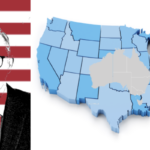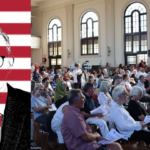Welfare Not Warfare: NUS Education Officer Xavier Dupé on Students Rejecting Militarisation Over Society
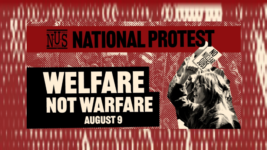
The Morrison government had already kicked the Australian constituency in the guts in September 2021, when it announced that we were entering a new security arrangement with the US and UK, known as AUKUS, which includes acquiring new submarines that require the nation to go nuclear.
However, this in no way prepared us for the next blow which came in March this year, when current prime minister Anthony Albanese laid in the boot, as he announced the details of the AUKUS submarine deal, with a price tag of $368 billion and subs designed to attack not protect.
As the searing pain from these prime ministerial assaults is starting to clear from the national consciousness though, it’s apparent that Australia is now entering into a brave new world of militarisation and build up to war against China.
And most of us are now asking ourselves why this is all necessary. Why would our nation want to blindly follow the United States down a path of destruction against our greatest trading partner that comes with a price tag that damns the people to a future of austerity and loss of wellbeing?
We’re all paying the price
Directly in the wake of the AUKUS price tag announcement in March, Coalition opposition leader Peter Dutton, who, as previous defence minister, has his fingerprints all over the deal, quipped that he’d support Labor in cutting the NDIS, disability supports, in order to finance the submarines.
Greens Senator David Shoebridge pointed out in May, that this is exactly what the government has done. And via this, coupled with the expectations of the AUKUS deal costs, Albanese has told the Australian constituency that it will be forgoing basic social needs in preference of militarisation.
Yet, this is at a point in time when the nation is going through a cost-of-living crisis and an affordable housing shortage that’s been deemed the worst since the Great Depression of last century. Although federal Labor has gifted some trimmings via its inadequate pretence to deal with the housing crisis.
And the university sector is also being restructured into a system that prioritises military technologies and offers courses that will advance the war machine, with the SA government last month, announcing a rise in student places in fields that will support the AUKUS submarine deal.
Students don’t want war
National Union of Students (NUS) education officer Xavier Dupé and president Bailey Riley have just launched the Welfare not Warfare campaign, calling out the refusal of the Albanese government to attempt to alleviate the social crises facing Australians at present, as its focuses solely on war.
Students will be taking to the streets nationwide on Wednesday 9 August, demanding that they don’t want to be educated in ways to enhance killing, so they can then go out to kill or be killed in a war against China, whilst not being able to afford a decent place to live whilst achieving these goals.
Sydney Criminal Lawyers spoke to NUS education officer Xavier Dupé about the demands the government is placing on them in terms of neglecting the social dilemmas they and the rest of the constituency face, while expecting them to grin and bear it, all in the name of a bleak future.
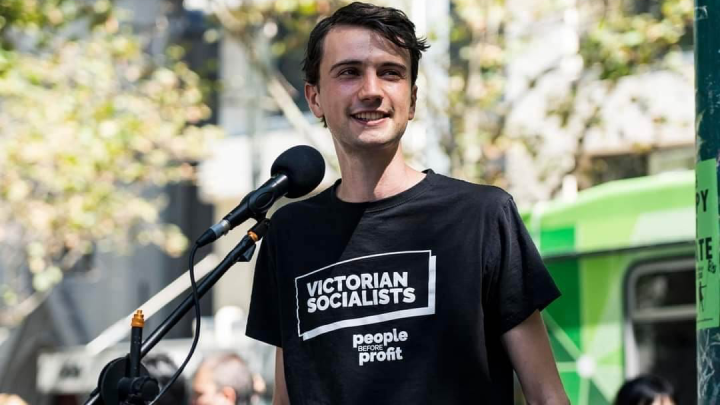
Xavier, you, as NUS education officer, and in conjunction with union president Bailey Riley, have just launched the Welfare not Warfare campaign, which is demanding “that the government cancel the AUKUS pact and invest in welfare and housing rather than the nuclear submarine fleet”.
So, that’s what students are calling for. Broadly speaking, how would you describe what’s going on in this country at the moment that warrants these demands?
We’re in what is being described as a cost-of-living crisis, specifically that means prices are going up while wages and welfare are not keeping pace, out of which billionaires and corporations, particularly the banks, are getting rich, while students and workers suffer.
So, rents continue to increase despite the fact there are plenty of empty investment properties around the country, in large part due to tax concessions that are given to investors and the decline of public housing.
Instead of addressing these problems by, for example, investing in government-run public housing or raising welfare above the poverty line, the Albanese government has chosen to spend $368 billion on nuclear-powered submarines.
This is totally the wrong set of priorities. And it is one that will leave JobSeeker and Youth Allowance recipients well below the poverty line.
It is one that will not alleviate the housing crisis that’s forcing young people to spend upwards of 30 percent of their income on rent, and, in some cases, getting increases of 30 to 50 percent overnight.
This policy will allow this situation to continue, while, at the same time, the supermarket giants, the banks and other corporations are making record profits.
The Morrison government signed us up for the AUKUS pact back in 2021, and Albanese sprung the huge cost of the nuclear-powered submarines on us in March, along with the deal details, which seem to keep changing.
What has the government embroiled us in by entering into the AUKUS alliance?
The government has signed us up to be part of a future war between the United States and China. These two superpowers are on a collision course, even if war is not imminent.
This is made clear by statements from both President Xi and Biden about increasing conflict of interests between these two powers.
By signing up to AUKUS, Morrison and now Albanese have committed Australia to be part of that and have put a target on the backs of people in Australia.
Some of what this looks like is military bases that are set to be expanded, for example, the ports in which US submarines and then the AUKUS submarines will be rotated.
From the recent announcement at the Quad meeting, it looks like Australian and US manufacturing will be more closely integrated, and it looks like closer integration of the Australian and US militaries.
That is something that puts Australians in danger, as well as pushes the world closer to war. Australia would be completely irrelevant to China were it not for the US alliance.
But by signing up to, for example, a port – possibly Port Kembla, although the government has tried to deny that – and turning that into a host for these nuclear-powered submarines, will then turn that port into a nuclear target.
The final thing to say on that is the submarines and the deal do not make us safer, as is often being portrayed.
These class of submarines and the nuclear propulsion technology have been chosen specifically because they allow for aggressive manoeuvres, because they can stay underwater for longer and reach China, and therefore, they exist for the purposes of attack, not defence.
This is something that will encourage a response on China’s side and, therefore, push the world closer to war.
The Welfare not Warfare campaign is also calling on universities to “boycott the AUKUS pact and its nuclear technology and sever ties with arms companies”. This is an aspect of the situation that’s not often top of the headlines.
What does it involve? And why is it problematic?
The latest federal budget included nearly $150 million for courses related to defence and nuclear.
The point of this is to create the research and skills that will be required to maintain and support the nuclear-powered submarines and the technology to go along with these.
So, in effect, what Albanese wants to do is to make Australian universities the research arm of the ADF and of this nuclear technology.
Particular students and the unions have rightly stood against nuclear in the past, recognising that it is something that goes along with war, something that’s incredibly dangerous, in terms of nuclear safety, and also, it always involves dumping waste on Indigenous land.
These moves will see an expansion of nuclear technology in Australia. And this is something that university bosses, vice chancellors, are taking up with gusto.
The CEO of Universities Australia Catriona Jackson enthusiastically signed up universities to provide support for this act of warmongering by the Albanese government, while the South Australian government recently announced a further 800 places for courses related specifically to AUKUS.
This is something students should reject because there’s no reason that our education should be used to empower and expand these dangerous industries and to push the world closer to war.
The sorts of things that students demand are courses and research that actually contribute to social good: things to improve the environment, necessary lifesaving medicine, chances to learn about history and explore new ideas.
This is the sort of education that students want, not one that will bind us closer to a war and that in the future, will see young people paying the cost.
You’ve already covered some of this, but on the flipside, how would you describe what’s happening on the ground in Australia, as its government signs off on a $368 billion bill for submarines that will take decades to cover?
The government has chosen to prioritise war over the good of its own people. Jim Chalmers insisted at the last budget, that we “can’t fund every good idea”.
This was their excuse for not expanding public housing, not increasing rent assistance commensurate with the average increase in rents, and for not increasing JobSeeker and Youth Allowance above the poverty line.
Instead, they did think it was a priority to spend $368 billion plus – as you’ve indicated could be half a trillion or more – on nuclear-powered submarines.
The government is trying to get Australians to accept that we have to suffer in poverty, so that money can be funnelled towards war.
Not only will this mean that students, young people and workers will be suffering from the effects of this into the future, but it also attempts to set a new precedent that the wellbeing of ordinary people doesn’t matter, while what does is driving the world towards war and investing in the military.
That is something we should reject, and it is one of the reasons that I am taking this stand to call for welfare not warfare.
So, as National Union of Students education officer, what do you consider the solution here? How should the government act from this point on?
First of all, they should break the AUKUS pact, because it does nothing to keep the world safer. All it does is push us closer to war.
They should cancel the $368 billion nuclear-powered submarine plan and, immediately, invest that into addressing the real problems that students and workers are facing in this country.
With that money, you could buy 1.4 million public housing units. Over the same period of the life of the AUKUS agreement, you could make education free for all students – undergraduate, postgraduate, both domestic and international – or you could increase welfare to at least $88 per day.
Any of these things could be achieved that actually address the problems ordinary people in this country are facing. That should be the priority over investment in the military.
We could go further than that, as not only are there these further bases under these agreements, but there are already US bases, such as Pine Gap, which are places where Australia helps the US dominate the world.
These things should be removed. And the ongoing military spending should also be redirected into education and social welfare.
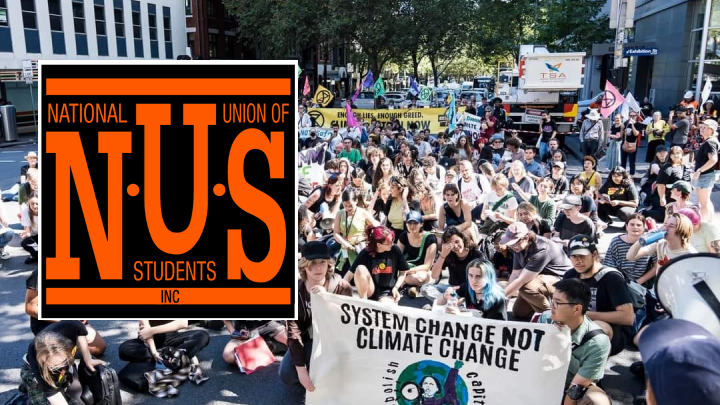
And lastly, Xavier, you and the NUS president are organising a national day of action, with Welfare not Warfare protests set to take place across the country on 9 August.
What will be happening on the day? And why should people be getting out on the streets and joining you?
Students will be protesting on campuses and in the streets all around the country. We’re going to be protesting against our own universities’ ties to the military, as well as the government’s prioritisation of war above addressing the cost-of-living crisis.
For example, in Adelaide, the focus is going to be on calling on universities to demilitarise. In Perth, we’re going to be targeting the ADF Careers Centre and saying that universities and the government should not be funnelling students into wars.
In other places, we’re going to be taking to the streets to cause disruption, make our voices heard and demand welfare not warfare.
And why should students get involved? Well, firstly, because we’re all feeling the cost-of-living crisis.
I have heard from students all around the country that can’t afford heating, and whose houses are falling apart, but feel like they can’t do anything about it, because housing is so expensive, they have very little choice about where to live.
So, part of this is about saying, “We need action on this crisis right now.”
The second reason that people should get out is because the government is getting away with allowing this crisis to run rampant, because they would rather spend money on nuclear submarines.
And the final reason that students should get out to protest is because it’s our universities that are being used to fuel and fund this war effort, which means that we have a responsibility to stand up to it and say no to war, no to militarism, and no to nuclear waste dumps on Indigenous land.
Education should be for the good of students and for society, not for profit and war.



